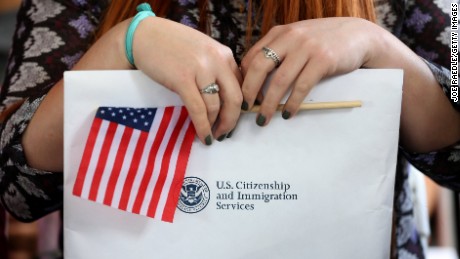US suspends expedited processing of H-1B visas
The US is temporarily suspending expedited processing of H-1B visas, eliminating the option of shorter wait times for the program that helps highly skilled foreigners work at US companies.
Under the current system, companies submitting applications for H-1B visas for potential employees can pay extra for expedited processing, which is referred to as premium processing.

Indian official says H-1B visas bolster jobs
Premium processing costs an additional $1,225 and ensures a response from the US Citizenship and Immigration Services in 15 days or the fee is refunded. Processing of standard H-1B applications -- those that are not premium -- takes between three to six months.
The suspension is effective April 3, and could last up to six months, according to USCIS.
The change comes as President Donald Trump is said to be drafting a new version of his court-halted executive order that banned travelers from seven Muslim-majority countries from entering the US. The new ban will exclude existing visa holders, sources familiar with the plan have told CNN.
Fierce competition
The H-1B visa program is the main pathway for highly skilled foreigners to work at US companies. Various industries, including tech, engineering, journalism, medicine and academia, vie each year for the program's 85,000 visas.
The visas are doled out by a lottery, and the number of applicants continues to swell each year. Last year, the demand was three times greater than the quota.
Outsourcing firms flood the system with applicants, obtaining visas for foreign workers and then farming them out to tech companies. They take a sizable cut of the salary.
While the visas are used to fill the US skills gap, Trump has spoken out about abuse of the program.
Calls for reform
A bipartisan bill introduced this week in Congress calls for reform of visas for highly skilled workers.
Lawmakers for years have debated proposals to change the popular H-1B visa program, with suggestions for how to fix it a highly contentious topic.
The proposed legislation would eliminate the lottery system in favor of a "preference system" created by USCIS to give priority to foreign students educated in the US. In doing so, it would aim to weed out foreign outsourcing firms, which are said to exploit the system.
It would also require employers to make a "good faith effort" to recruit American workers over foreigners, as well as give the departments of Homeland Security and Labor more authority to investigate fraud and abuse.
News Courtesy: www.cnn.com











